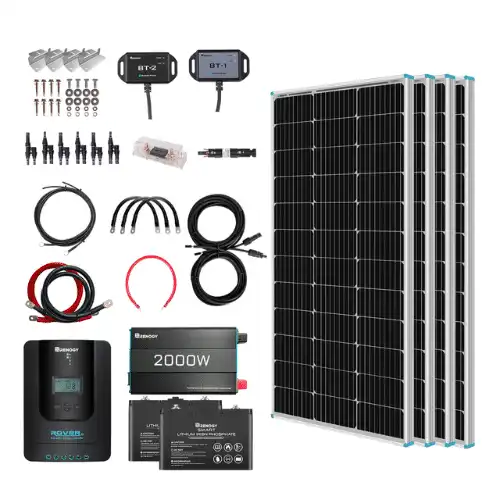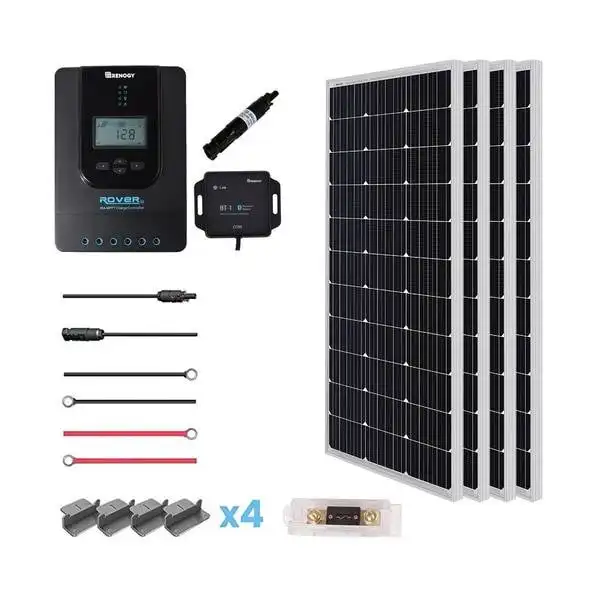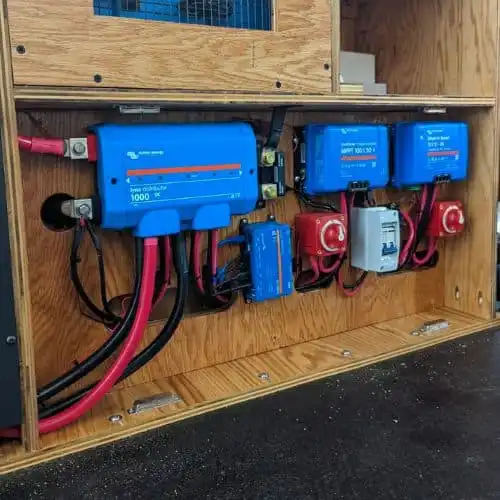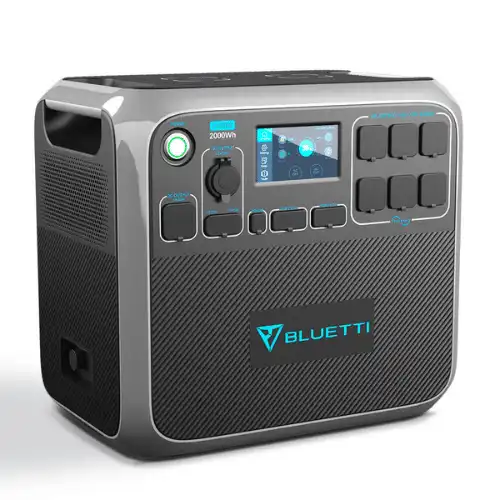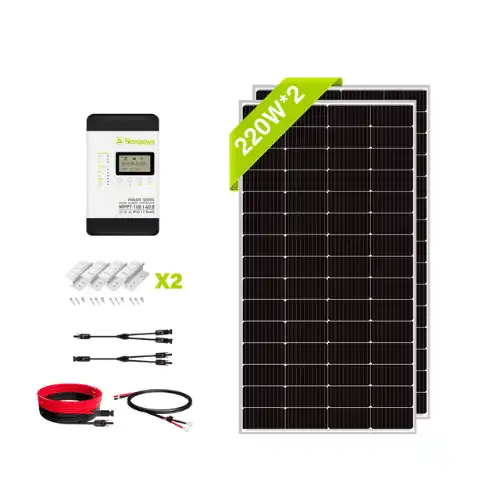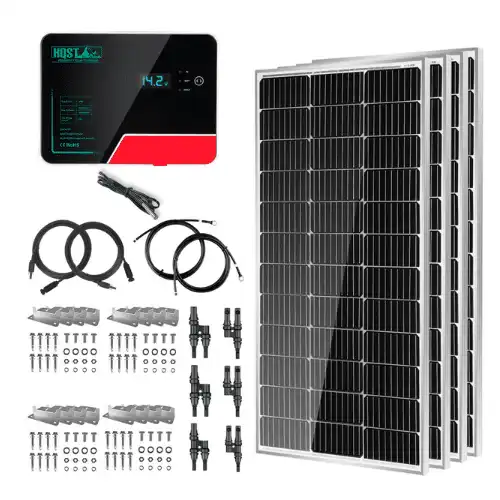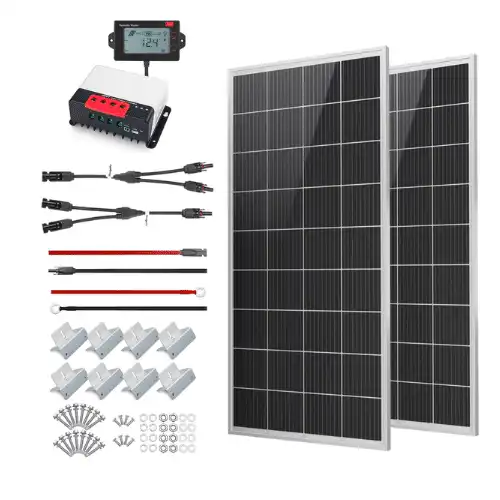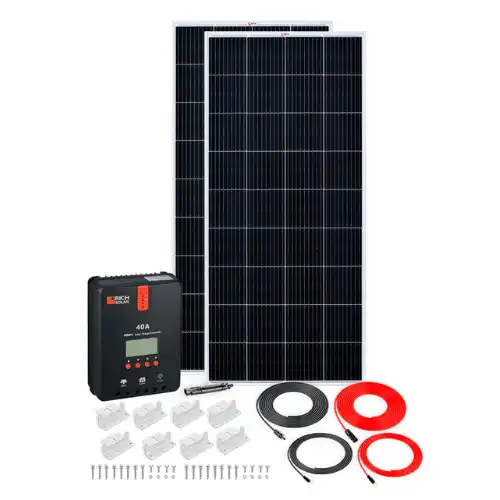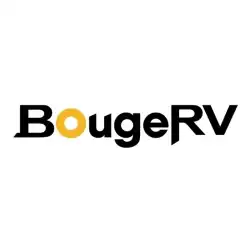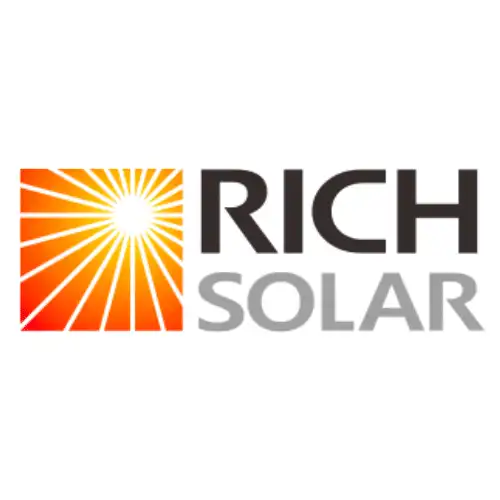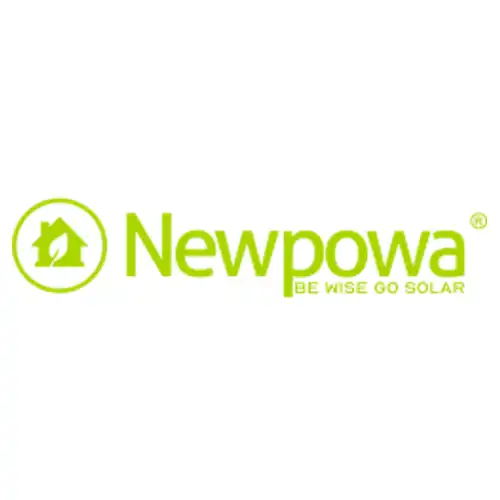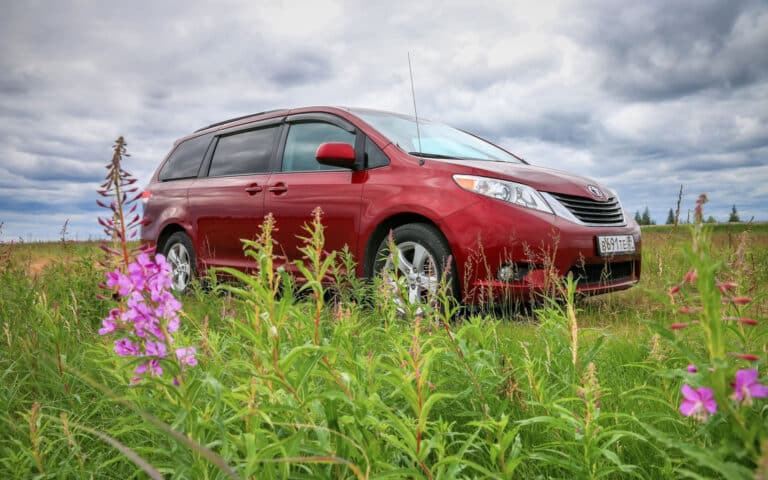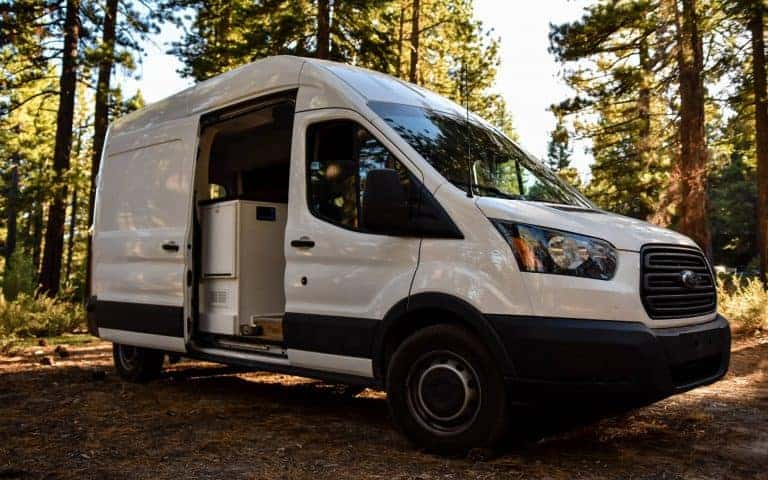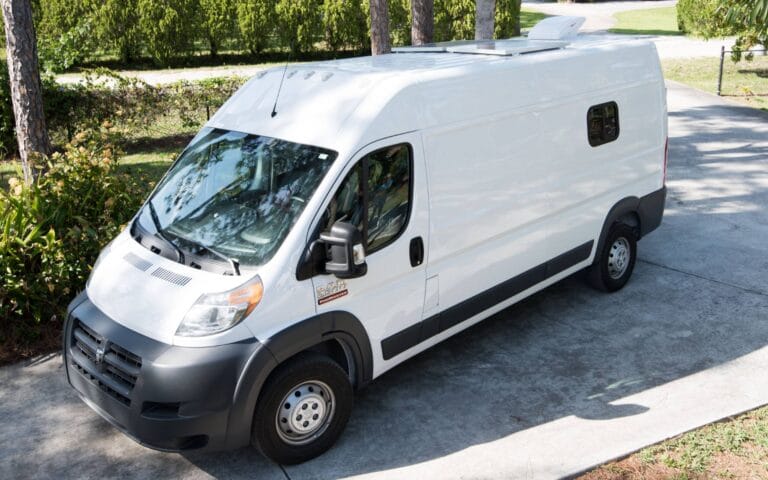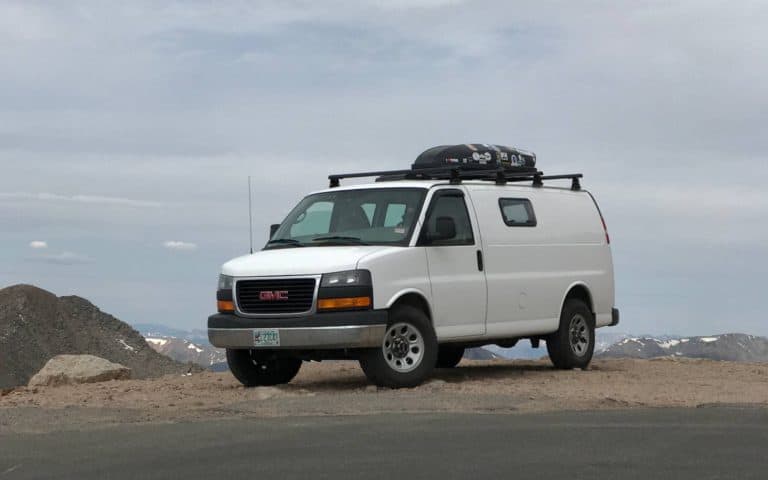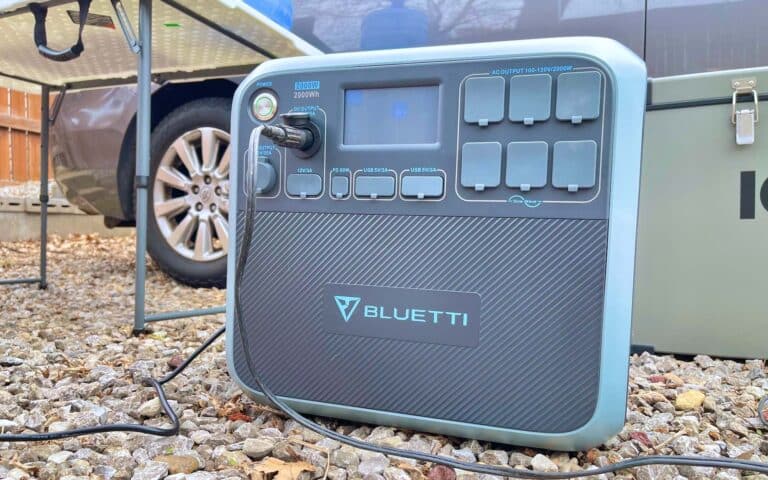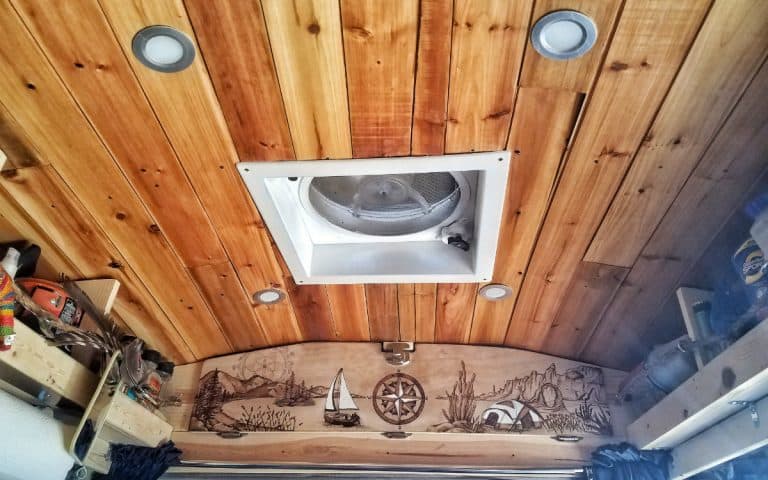Installing an RV solar panel kit in your DIY campervan or RV can save you time, money, and headaches compared to cobbling together a solar electrical system on your own. With one purchase you can have all your main components at your doorstep – and you know they’ll be compatible.
But solar panel kits are not created equal. There are a ton of lower-quality bundles out there with outdated or inferior components, and Amazon in particular is a minefield of dubious products.
In this post, we dig into the ins and outs of solar power kits for van life. We tell you what to look for and what to avoid, and guidance on system sizing. And we give you a detailed roundup of kits that are actually worth buying, so you can find the best option for you.
But first, here are our top picks for the best RV solar panel kits.
This post is adapted from our ebook Vanlife Solar Basics.
Are you tired of jumping from website to website trying to wrap your head around your van’s electrical system? Our comprehensive guide covers everything from fundamentals to components to sizing to installation, all in one easy-to-follow package.
Our Top Picks for the Best RV Solar Panel Kits
Just about everything you need to wire solar in your van. Unlike most kits, this one includes 200Ah of self-heating LiFePO4 batteries (or AGM), 2000W pure sine inverter, wiring, connectors, and fuses.
Enter discount code Gnomad8 for 8% off at Renogy.com
The Complete kit without the batteries or inverter. Available in various sizes to fit your electrical needs.
Enter discount code Gnomad8 for 8% off at Renogy.com
The highest quality Victron solar components bundled together in a convenient package by Unaka Gear Co.
Enter discount code GNOMADHOME for 5% off at Unakagearco.com
Large capacity solar generator with enough battery capacity and solar input to fully power your camper van or RV.
440W of quality 9BB solar panels, an MPPT charge controller, and a low price make this Newpowa solar kit a great budget option.
Enter coupon code GNOMAD10 for 10% off at Newpowa.com
Jump to the detailed roundup >>>
What is an RV Solar Panel Kit?
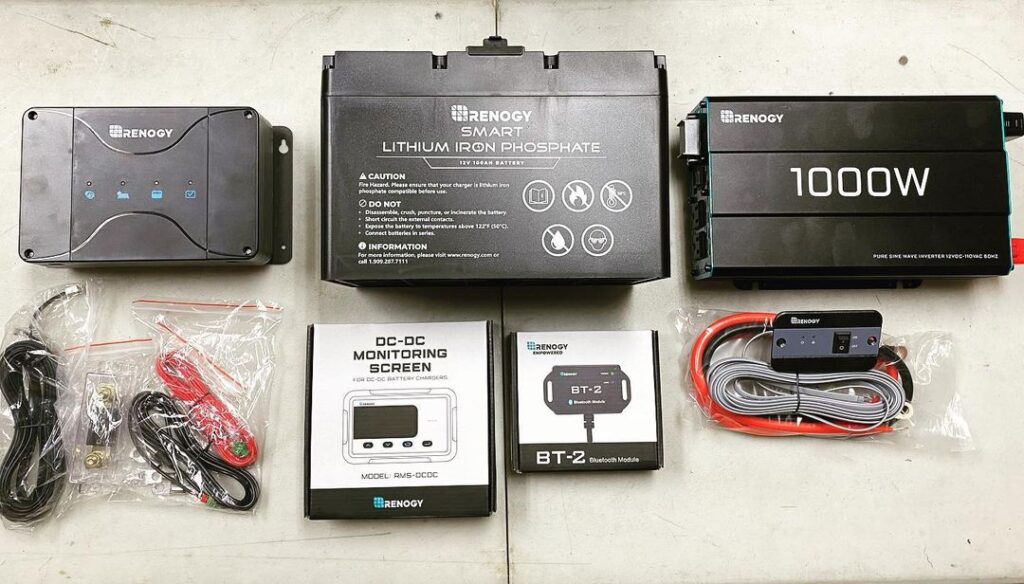
RV solar panel kits bundle the major components that you need to install a solar electrical system on your campervan or RV. For our purposes, we’ll break these kits down into three categories: basic solar panel kits, complete solar panel kits, and plug-and-play systems.
- Basic solar panel kits typically include RV solar panels, a solar charge controller, mounting brackets, wiring, and fuses for solar panels. They’re a great start to your solar setup, but you’ll still need to get additional wiring and vital components like campervan batteries and an inverter.
- Complete solar panel kits throw in batteries and an inverter, so you’ve got all the major pieces covered. There might be a few odds and ends you’ll still need, but you’ll have the bones of your system ready to install.
- Plug-and-play solar systems are self-contained power stations that you can just throw in the back of your van, no installation required. You can charge these up via portable solar panels, roof-mounted solar panels, DC plug while driving, or AC wall outlets in between trips.
Solar power kits come in all different sizes and power levels, so you can find an option that will work for your electrical needs and budget.
If you just need enough power to run some lights and charge your devices, a smaller system will work just fine. However, if you’re looking to run vent fans, a 12V portable refrigerator, and other power-heavy appliances, you’ll need to expand the size (and cost) of your van solar panel kit.
Before purchasing your RV solar panel kit, it’s important to think about the amount of electricity you plan on using and buy a kit that will suit your power consumption needs.
Our guide to van life electrical has full instructions for sizing your system so you can be sure you have enough power.
Is an RV Solar Panel Kit Worth It?
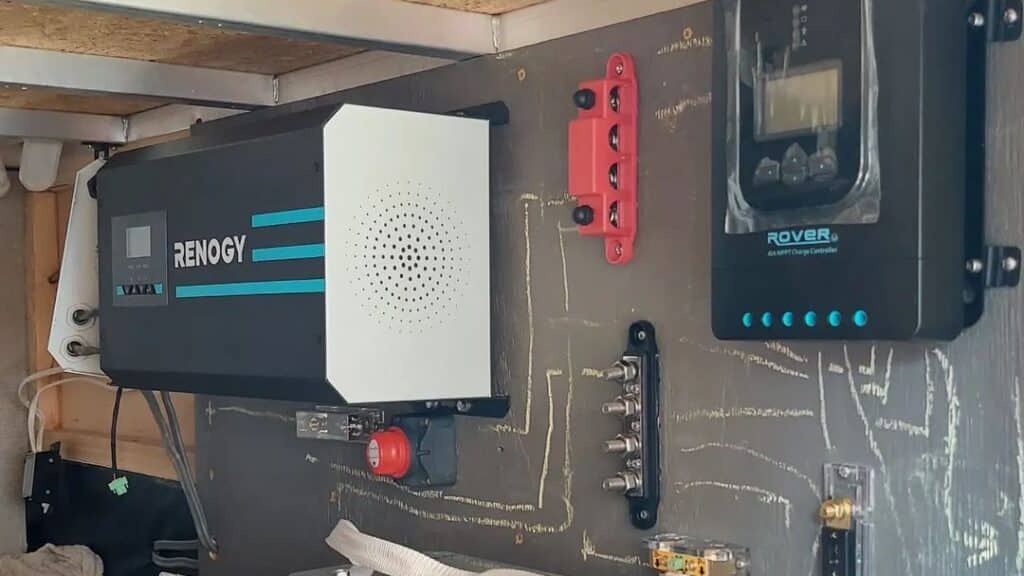
Solar panel kits for RVs and camper vans can be worth considering for your rig, but they may not be right for everyone.
Advantages of RV solar Panel kits
One advantage is cost savings. Bundling the major components and wiring typically allows you to save money compared to buying everything individually. For example, let’s compare Renogy’s Premium Solar Kit vs buying each component:
Renogy 400W Premium Solar Kit: $819.99
VS
Individual Components:
- (1) 40A Rover MPPT Charge Controller: $199.99
- (1) BT-1 Bluetooth Module: $39.99
- (4) 100W Mono Solar Panels: $519.96
- (1) Z-Bracket Set: $17.99
- (1) 10A Inline MC4 Fuse: $15.99
- (1) 40A ANL Fuse: $15.99
- (3) Solar Y Branch Connectors: $59.97
- (1) 20ft 10AWG MC4 Cable: $34.99
- (1) 2ft 8AWG Fuse Cable: $19.99
- (1) 8ft 8AWG Tray Cable: $36.99
Individual component total: $961.85
Premium Solar Kit Total: $819.99
Difference: Solar kit is $141.86 cheaper
As you can see, you’ll save over $100 with the kit. And these savings are if you buy everything at full price – you can often save even more when Renogy runs their frequent sales.
Solar panel kits also for RVs make installing your solar system easier because you won’t need to spend time and energy researching and selecting every part of your system. If you’re not an expert in solar power, you won’t need to worry about if your charge controller can handle the voltage from your solar panels or whether you have the correct wiring and fuses. It’s all in the kit.
Portable power stations make all of this even easier. Prices on these units are low enough now that you’re not paying extra for the convenience. There are powerful options that can accommodate all but the most extreme electrical needs. And there’s no installation required aside from mounting solar panels (if you want).
Pros
- You can save some money vs buying everything individually
- They include most of what you need for installing solar panels
- You won’t need to spend time and energy selecting every single component
- A power station can be a good all-in-one solution
Disadvantages of RV solar panel kits
The biggest downside is that you lose the flexibility to select your specific components. You’re locked into whatever is included in the kit. Although the best RV solar panel kits include quality components, if you want a specific charge controller or solar panel that’s not available in kit form, you’re SOL.
You also need to be careful that you don’t buy a solar kit with inferior components, especially if you’re not well-versed in solar. Many budget kits come with less-efficient PWM charge controllers, which we recommend steering away from in favor of MPPT charge controllers (you’ll be in good shape with any of the kits we recommend in this article).
Solar power kits for RVs include the big stuff, but they don’t include everything. You’ll still need to source additional wiring, fuse blocks, inline fuses, bus bars, and outlets. And unless you get a complete kit, you may even have to pick out a campervan battery and 12V power inverter.
So while van solar panel kits simplify things, they don’t eliminate the need to figure out your system and select the odds and ends to complete your electrical installation (that is, unless you go with a power station).
Cons
- Limited selection of individual components
- Need to watch out for kits with inferior components
- Kits don’t come with absolutely everything
What to Look For in an RV Solar Panel Kit
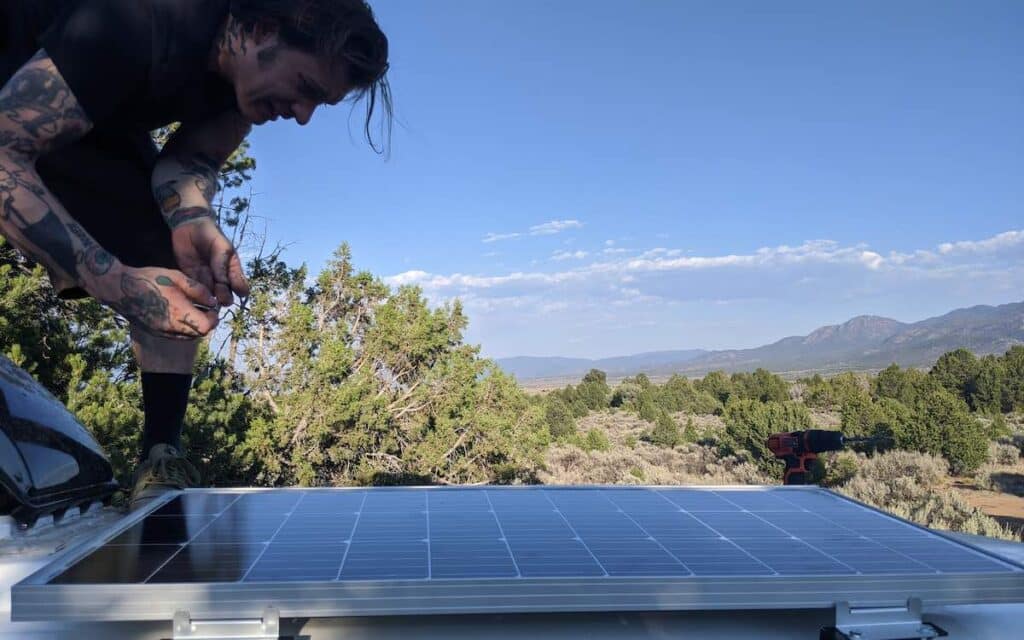
There are a few things to look out for when choosing the best solar panel kit for your RV or campervan solar setup.
- In general, we recommend choosing a kit with rigid monocrystalline 9BB solar panels and an MPPT charge controller.
- If you go with a complete kit that includes batteries and an inverter, we recommend a pure sine wave inverter and LiFePO4 batteries (AGM batteries are fine if you can’t afford lithium).
- Get a kit that’s big enough for your needs. 200W of solar is the bare minimum, and 400W is adequate for most users. But if you have a lot of power-hungry appliances you may need more.
Let’s dig into what all this means so you can make the best decision for your rig.
Solar Panels: Rigid vs Flexible Panels and Beyond
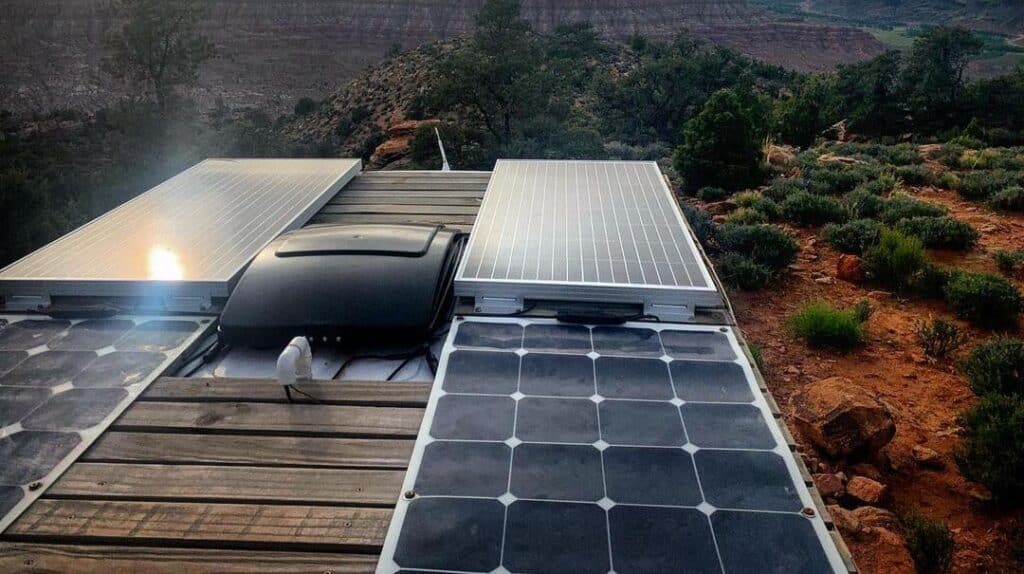
The RV solar panels themselves are the cornerstone of any solar panel kit. Most kits come bundled with rigid solar panels, but if you prefer flexible solar panels you have some options.
Rigid solar panels are much cheaper, far more durable, and last longer (20-25 years). However, rigid panels are more difficult to mount, especially for rigs with curvy roofs. Rigid panels also stand out a whole lot more, which can make stealth camping in cities more difficult.
Flexible solar panels are easier to mount and can conform to curvy and odd-shaped roofs. They lay completely flat on your roof, which makes them less obvious and better for stealth camping. But, they’re far more expensive, not as durable, and don’t last as long (3-5 years). If you care more about stealth than your budget, flexible panels could be a good option.
Portable solar panels are foldable panels that are great as extra panels or for temporary setups with solar generators. These won’t be your primary solar panels unless you’re mainly using them for the occasional camping trip.
Once you’ve decided on your solar panel form factor, you need to decide on the type of solar cell. There are three types of solar cells you’ll find in solar power kits:
- Monocrystalline solar panels are the most common, and what we recommend. They’re the most efficient and are generally affordably priced. Monocrystalline panels come in both rigid and flexible form factors.
- Polycrystalline solar panels are less efficient, but also less expensive. However, the modest cost savings generally isn’t worth the drop in efficiency.
- Thin film amorphous solar panels (such as CIGS panels) are a type of flexible panel that is highly bendable and produces more power in low light conditions than standard monocrystalline panels. They’re also more durable and longer-lasting than flexible mono panels. However, they’re much more expensive than other types of panels (2x the cost of flexible mono panels and 4x the cost of rigid mono panels).
With monocrystalline panels, you’ll also have a choice in the number of bus bars (BB) included – the more bus bars, the greater the efficiency, and the less the panels are affected by partial shading. The best solar panels for campervans and RVs are the newer 9BB panels, and all of our recommended kits feature 9BB solar panels.
Read More: The Best Solar Panels for Van Conversion Power Systems
Bottom Line: Go with rigid monocrystalline 9BB solar panels for the best combination of cost, efficiency, and durability. Unless you have a huge budget and prioritize stealth camping – then you could consider flexible panels.
Solar Charge Controllers: MPPT vs PWM
Charge controllers take the electrical current from your solar panels and regulate the voltage to properly charge your battery bank. There are two types of solar charge controllers: PWM and MPPT.
You’ll find PWM charge controllers in many budget solar panel kits. But we recommend steering clear because they are far less efficient, especially when it comes to higher-wattage solar arrays wired in series. The few bucks you’ll save with a PWM charge controller will end up costing you a lot in reduced efficiency – up to 30% power loss vs MPPT.
MPPT charge controllers can take the higher voltage of larger solar setups and regulate it down to charge your batteries without losing efficiency. This means you’ll get more out of your solar panels – which is vital when you live on the road. They’re a bit more expensive than PWM, but the cost is 100% worth it.
Read More: Should You Wire Your Solar Panels In Series Or Parallel?
Bottom Line: Go with MPPT. Unless you’re on a super barebones budget, don’t even consider solar panel kits with PWM charge controllers.
Choosing Batteries and an Inverter
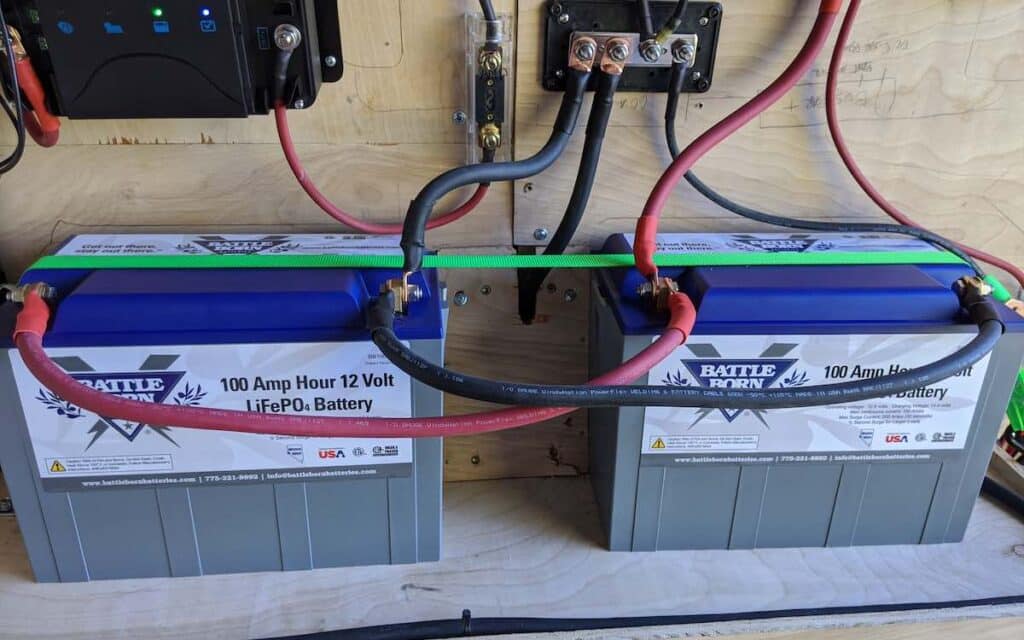
Most RV solar panel kits don’t come with batteries or an inverter – meaning you’ll need to buy your own.
When it comes to batteries, Lithium Iron Phosphate (LiFePO4 or LFP) is the best choice. LFP batteries are lightweight, safe, charge quickly, and allow you to fully discharge them without damage. They’re more expensive upfront, but cheaper in the long run because they last longer. If you can afford the price tag, get these.
AGM batteries – the other main type of campervan batteries – are a type of lead acid battery. They work just fine and are easier on your wallet. However, they’re much heavier, and you can only discharge them down to 50% – meaning you’ll have to keep a closer eye on your power consumption vs lithium batteries.
For an inverter, look for a good pure sine wave inverter and size it based on your battery bank. To do this, find the max discharge current of your battery bank and multiply it by your system Voltage (12V). The result is the maximum surge Wattage – get an inverter with a surge rating at or below this number.
Example: 250A max discharge current x 12V = 3000W maximum surge. Buy an inverter with a surge rating lower than 3000W -OR- size up your battery bank if you need a bigger inverter.
Read More: The Best 12V Power Inverters for Van Life
You can avoid these detailed sizing calculations by seeking out an RV solar power kit that includes battery storage and an inverter – such as Renogy’s Complete Solar Kit or a portable solar generator.
Bottom Line: Go with an LFP battery and a pure sine wave inverter. Make sure the max discharge current of your battery bank can handle your inverter’s surge rating.
Portable Power Stations
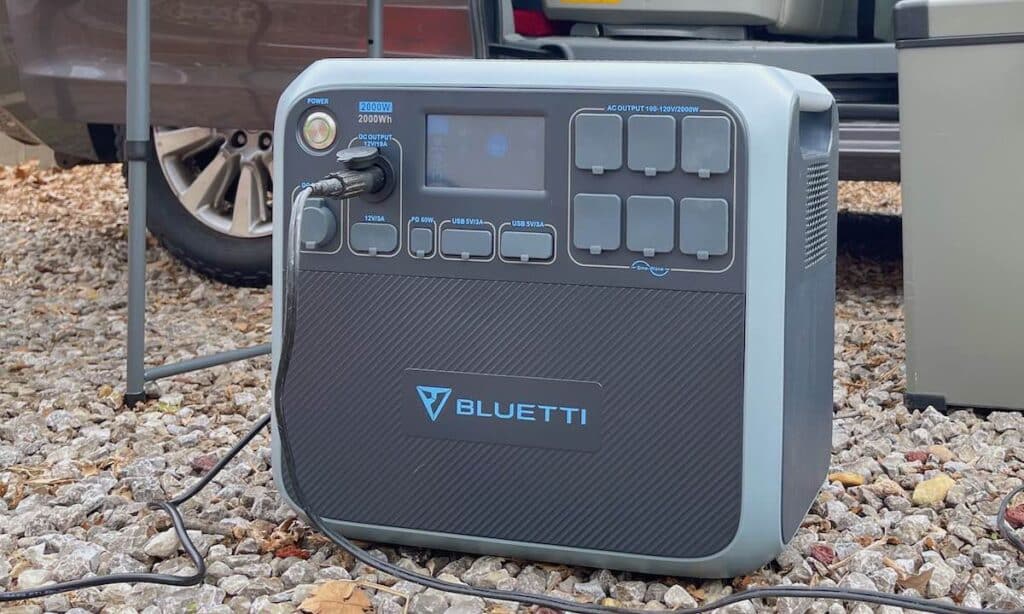
If you want a powerful electrical hub for your campervan or RV but don’t want to deal with wiring and installation headaches, then a power station might be for you (also called a solar generator). These units are lithium battery packs, solar charge controllers, DC-DC chargers, and input / output ports all built into one.
There are tons of power stations out there all with different features. Many are geared towards weekend camping trips or home power backup and aren’t the best for van life. So what should you look for?
- Lithium iron phosphate batteries. When manufacturers advertise “lithium batteries” they’re typically talking about Lithium NMC batteries. We recommend seeking out units with LFP (lithium iron phosphate or LiFePO4) batteries, which are safer and last longer. If a power station has LFP batteries, it will say so. If it just says “lithium” then it probably doesn’t.
- DC power output. Make sure the DC power output current is high enough for your electrical needs. Jackery products, for example, can only output 10A of DC current. In contrast, the Bluetti AC200P is capable of 30A of DC output.
- Proper DC output ports. You want a power station that has secure DC output ports, not just a 12V cigarette lighter plug, which can be prone to coming loose.
- Enough solar input Wattage. Make sure the solar input Wattage is adequate for your power usage so that your power station stays charged. Some solar generators can only accept 200W of solar input, whereas others can accept 800W (or more).
- Expandability. If you want the ability to expand your system down the road, some power stations allow you to plug in additional batteries for more capacity. You’ll pay more for this feature, however.
Read More:
- Bluetti AC200P Review: Portable Power Station for Full Time Van Life
- Jackery Explorer 1000 Review: Is This a Legit Option for Vanlife?
Bottom Line: Not all power stations are suitable for full-time road life. Look for units with LFP batteries, high enough DC output and solar input, and secure DC ports beyond just a cigarette lighter plug. Bonus if it’s expandable.
How Big of a Kit Do You Need?
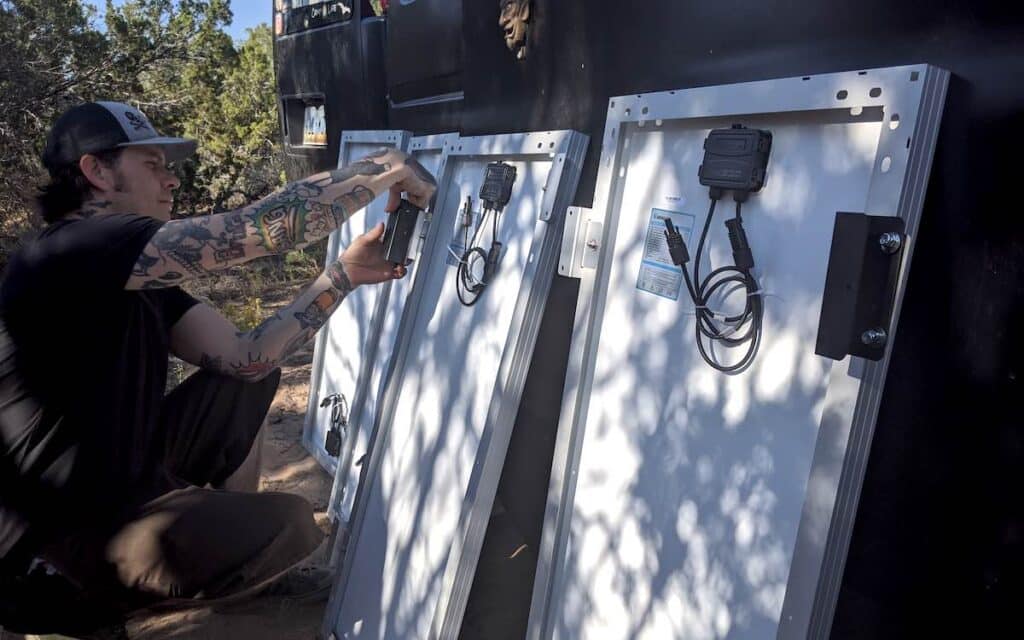
The best RV solar panel kit for you depends on your energy needs and how often you plan to go off-grid. The more power-hungry appliances you use – and the more you plan to boondock in the wilderness far from a plug-in power connection – the more panels and batteries you’ll need.
A 200W system is a bare minimum for basic needs, but you’ll be better off with a 400W system if you’re trying to run a vent fan and a fridge on top of charging devices and maybe using some small appliances here or there. If your energy needs are greater, you may need an even larger system.
To properly size your system, calculate your daily power consumption in Watt-hours (Wh), add up the Wattage of all your appliances multiplied by the number of hours you’ll use them each day (W x hours = Wh). Your solar panel system should produce at least this many Watts throughout the course of a day – but it’s a good idea to size up about 1.5 times this amount to account for inefficiencies and those not-so-sunny days.
A general rule of thumb for sizing your battery bank is to install 50Ah of lithium batteries for every 100W of solar panels, or 100Ah of AGM batteries for every 100W of solar.
You can and should do more detailed power calculations to really dial things in, but these rough guidelines will get you most of the way there.
Note: If budget is your primary concern, buy the biggest system that you can afford and adjust your energy usage based on what you have available.
Bottom Line: 400W of solar paired with 200Ah of LFP batteries is the sweet spot for most – but you can get by with 200W for basic things. Calculate your actual energy needs to get an exact number. Or, buy what you can afford and adjust your power usage accordingly.
Best RV Solar Panel Kits for Van Life
Best Complete Kit: Renogy 400W Complete Solar Panel Kit
Just about everything you need to wire solar in your van.
Unlike most kits, this one includes 200Ah of self-heating LiFePO4 batteries (or AGM), 2000W pure sine inverter, wiring, connectors, and fuses.
Enter discount code Gnomad8 for 8% off at Renogy.com
It’s tough to beat Renogy when it comes to solar. Their Complete Solar Panel Kit is the easiest way to get everything you need for a DIY solar system in your campervan. Unlike most solar power kits out there, this kit includes batteries (your choice of LFP or AGM) and a 2000W pure sine inverter.
Top-of-the-line 9BB panels and a 40A MPPT solar charge controller form the heart of this kit, and the included Bluetooth modules add the capability for monitoring your system performance from your phone.
Beyond that, this is one of the more, er, well, complete kits on the market. It not only includes all the wiring and mounting equipment you’ll need, but it also comes with an MC4 fuse for your solar panels and an ANL fuse for your batteries (strangely, it doesn’t include an inverter fuse).
Renogy in general makes solid products, and we’ve successfully installed and used their kits in our van and in friends’ vans. If you want to grab all of your main components in one go, you can’t go wrong with the Renogy Complete Solar Panel Kit.
Best Basic Kit: Renogy Solar Premium Kits (various sizes)
Everything you need to add solar to your van. Including solar panels, mounting brackets, MPPT charge controller, fuses, and wiring. Available in 100W, 200W, 400W, 600W, and 800W.
Enter discount code Gnomad8 for 8% off at Renogy.com
Renogy’s Premium Solar Kits are the best option if you like the convenience of a kit but want the ability to select your own batteries and inverter.
This solar panel kit includes 9BB solar panels, an MPPT solar charge controller, inline fuses, wiring, and mounting hardware – basically everything included in the Renogy Complete Kit, with the exception of the battery storage and inverter. Renogy kits include all the inline fuses you’ll need, saving you the extra guesswork.
With this kit, you have the freedom to choose premium battery options like Battle Born batteries or save money with solid budget options like LiTime LFP batteries. You’ve got the basic solar components covered, and you can customize the rest of your system exactly how you’d like.
Renogy also offers premium kits in a variety of sizes, so you can go as big or as small as you want. We installed a 400W Renogy solar kit in our first van and it was the perfect size for full-time off-grid van living. But whether you need a whole lot more energy or you think you can get by with a single 100 Watt solar panel, there’s a Renogy Premium Kit option for you.
Best High-End Kit: Victron Electrical System Kit from Unaka Gear Co
The highest quality Victron solar components bundled together in a convenient package by Unaka Gear Co.
Enter discount code GNOMADHOME for 5% off at Unakagearco.com
If you’re building out a high-class rig like a Sprinter van or Ford Transit, chances are you’ve seen various van life YouTubers putting Victron stuff in their vans.
Victron makes premium solar components that are top-of-the-line in every way. From charge controllers to DC-DC chargers to inverters, their products are some of the best out there (with price tags to match). Aside from being expensive, the trouble is that Victron doesn’t bundle their components together in kit form – meaning you have to really know what you’re doing to cobble together a working system.
Enter vanlife outfitter Unaka Gear Co. Their Victron power kit includes all the main components, and even gives you the option to select specific variations based on your needs. This premium kit is an ideal solution for vanlifers who want the best of everything with the simplicity of a pre-made bundle. Unaka even gives you a handy list of what’s not included, so you know what you still need to buy.
While Victron components are excellent, you can save a ton of money and still have all the power you need for off-grid living with a Renogy Premium Kit. But if you want the best-of-the-best and have the budget for it, Unaka Gear Co’s Victron bundle simplifies things quite a bit.
Best Power Station: Bluetti AC200P Portable Power Station
Our top pick for the best portable power station for full-time van life, the Bluetti AC200P is fully capable of being the hub for your rig. With 2000Wh of LFP battery (about 167Ah) and a 2000W pure sine inverter, and up to 700W or solar charging input, the AC200P can handle all the most power-intensive uses and come back for more.
Where the AC200P really beats out most other solar generators, however, is the output ports. Rather than relying on a 12V cigarette lighter port for DC output, the AC200P includes a rock-solid aviation plug that can deliver up to 30A of current. That’s more than enough to run all your DC appliances, and you won’t have to worry about the plug knocking loose.
For solar charging, you can buy the Bluetti AC200P bundled with various portable solar panel configurations. But we recommend picking up some of our top-recommended solar panels, mounting them on your roof, and plugging them into the Bluetti’s secure aviation plug solar input. This takes a bit of cobbling together, but once your panels are mounted and wired you’re pretty much all set as far as major components go.
If you’re looking for a solar power kit because you want a simple and easy solution to get electricity in your rig, you can’t get more plug-and-play than the AC200P.
Note: Want even more battery capacity? The Bluetti AC200 Max adds the ability to daisy chain additional batteries.
Best Budget Kit: Newpowa 440W 12V Mono Solar Panel Kit
440W of quality 9BB solar panels, an MPPT charge controller, and a low price make this Newpowa solar kit a great budget option.
Enter coupon code GNOMAD10 for 10% off at Newpowa.com
This budget-friendly kit from Newpowa will get you off on the right foot without making a huge dent in your wallet. In contrast to the 100W panels on offer in most solar power kits, this Newpowa kit includes two 220W 9BB mono solar panels, which could be a good option if you prefer larger panels. And these 9BB panels are solid – in fact, they’re our top pick for budget solar panels.
While Newpowa’s RV solar panel kit includes wiring, mounting brackets, and a 40A MPPT solar charge controller, it doesn’t come with inline fuses – so make sure to get some. And while this kit usually costs less than most other options, Renogy often runs sales that make their kits even cheaper – so do some price shopping before pulling the trigger.
HQST 400W Monocrystalline Solar Panel Kit
Renogy quality on a budget. This HQST kit includes 400W of 9BB solar panels and a 40A MPPT charge controller for a super low price.
HQST is Renogy’s budget label, and many of their products are damn near identical. If you want to save some money on quality solar products by skipping the premium branding, then this HQST solar panel kit is a solid option. It comes with high-quality 9BB mono solar panels, an MPPT charge controller with built-in Bluetooth, z-brackets for mounting, wiring, and connectors.
If HQST is so cheap, why would you go with Renogy instead? While the solar panels are close to identical, Renogy offers a much more robust ecosystem of products that all connect and talk to each other. HQST’s solar charge controller gives you Bluetooth monitoring, but the full Renogy kit allows you to monitor and manage all of your components simultaneously.
But if you don’t care about all that and just want a working solar setup in your rig for an affordable price, HQST is a killer option.
BougeRV 400W Solar Starter Kit
Our favorite campervan solar panels bundled with a 40A MPPT charge controller, wiring, and mounting brackets.
Enter discount code Gnomad for 16% off at Bougerv.com
BougeRV’s 400W solar starter kit includes two of their top-notch 200W 9BB solar panels, a 40A MPPT solar charge controller, mounting brackets, and wiring. This kit also comes with a remote monitoring meter, so you can keep an eye on your battery Voltage without having to mount your solar charge controller out in the open.
BougeRV’s 9BB panels are our current top picks for best campervan solar panels. Their other components are high quality as well, and they continue to release new innovative products for the RV and van life markets. This BougeRV solar panel kit is a solid choice for your rig.
Rich Solar Rigid Mono Standard Solar Panel Kits
Solar power kits with 9BB mono panels and MPPT charge controllers in a ton of different sizes.
Enter discount code GnomadHome for 10% off at RichSolar.com
The rigid mono RV solar power kits from Rich Solar is another solid option that bundles high-quality components at a good price. These kits include 9BB mono solar panels, wiring, mounting brackets, an inline MC4 fuse, and an MPPT charge controller (20A, 40A, or 60A, depending on kit size).
And Rich Solar offers more kit sizes than the other solar manufacturers we mention here. Whether you’re looking for a small 100W kit with just one panel, or a huge 1600W kit that can power an off-grid cabin, there’s a Rich Solar RV solar panel kit for you.
Solar Discount Codes
To help you get the best deal on solar for your van or RV, we’ve negotiated coupon codes from some of our favorite brands.
(affordable)12V fridges, solar panels, batteries, power stations, accessories, and more.
Use discount code GNOMAD for 16% off at bougerv.com
Solar kits, inverters, DC-DC chargers, accessories, and more!
Our exclusive coupon code includes sales items and batteries. You won't find these discounts anywhere else.
Enter discount code Gnomad8 for 8% off at Renogy.com
Large and small solar kits, panels, inverters, batteries, and accessories.
Enter coupon code GNOMADHOME for 10% off at Richsolar.com
High-quality solar components at an affordable price.
Enter discount code GNOMAD10 for 10% off at Newpowa.com
Vanlife outfitter Unaka Gear Co sells all kinds of van conversion supplies, including top-of-the-line Victron solar components, as well as electrical wiring, tools, and connectors.
Enter discount code GNOMADHOME for 5% off at Unakagearco.com
FAQ
Do Any RV Solar Panel Kits Come With an Inverter and Battery?
There are a handful of RV solar power kits that include batteries and an inverter, but there are many more that do not. Buying a “complete” RV solar panel kit with everything included is a great way to make sure all your components are properly sized and compatible with each other.
Can you run an RV completely on solar power?
It’s very possible to have an entirely solar-powered RV – as long as you have the budget and the right expectations. Larger RVs with tons of electrical components like TVs and air conditioners will cost a lot more to properly outfit your RV roof with solar. If you want to boondock in such a rig, you may need to dial back your power usage a bit and save the power-hungry things for when you’re plugged in at a campground. But if you have a smaller campervan and aren’t trying to run an AC, then you can easily run everything you need with nothing but solar power.
How many batteries do I need for my RV solar system?
The size of your RV’s battery bank depends on your power usage. 100Ah of LFP battery is the minimum and will allow you to run a vent fan, 12V refrigerator, lights, and device charging. If you have more power needs, then you’ll need a larger battery bank. We recommend sizing your system based on how much electricity you anticipate using. Alternatively, you can build your system based on your budget and adjust your electrical usage based on what’s available.
How many solar panels do I need for my RV or camper van?
How many solar panels you need for your camper van or RV depends on your electrical needs and the size of your battery bank. We recommend installing at minimum 100W of solar for every 50Ah of LFP batteries or every 100Ah of AGM batteries. We recommend sizing your system based on your usage. However, as a rule of thumb, 200W of solar is the bare minimum, but 400W is a much safer bet.
Can you run an RV air conditioner with solar power?
You can run an RV air conditioner on solar power. But an air conditioner uses so much electricity that you would need a very large – and expensive – solar setup to do so.
For example, you would need an additional 200Ah of LFP batteries (at minimum) to run a Dometic Penguin II air conditioner all day. That’s just for the air conditioner and doesn’t include powering all your other appliances. You would also need another 400W (minimum) of solar panels, and the roof space to accommodate them.
Between the solar panels and batteries, that’s another $2000-$2500 in costs to power an air conditioner with your solar setup. Electrical systems are already expensive, and you may not have the additional budget (or space on your RV’s roof) for this added luxury.
It’s much more feasible to run your air conditioner via a shore power connection when you’re plugged in at campgrounds. When you’re off boondocking, having plenty of ventilation, seeking out shade, and installing an awning on your rig are all ways to stay cool in even the hottest weather.

